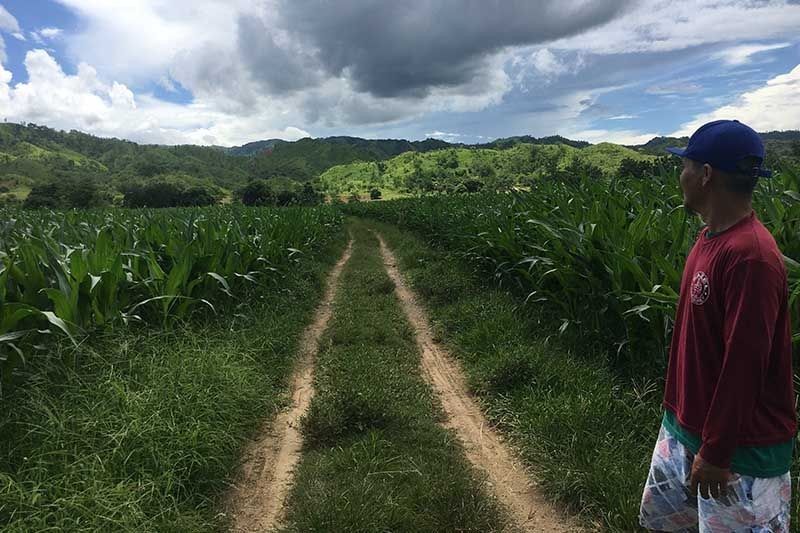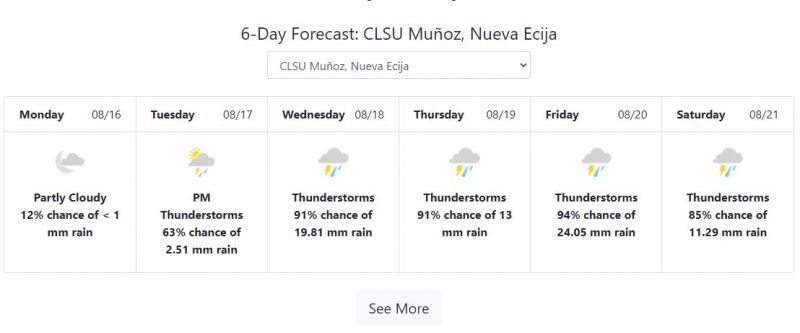Smart technologies aim to reduce the climate risks Filipino farmers face

LUPAO, Nueva Ecija — Weather monitoring and forecasting through technology is helping farmers in Nueva Ecija manage their crops and increase productivity as the country deals with the impacts of climate change.
Knowing the chance of rain and the expected amount of rainfall just by checking a weather forecast dashboard on his phone makes it easier for Isagani Cajucom, a farmer in Lupao town, to manage the corn that he plants.
The tool, which is one of the components of Project SARAI (Smarter Approaches to Reinvigorate Agriculture as an Industry in the Philippines), helps farmers like Cajucom decide when to plant, irrigate, apply fertilizer and harvest.
Cajucom grows corn—which then become silage, or fermented and stored fodder fed to ruminants such as dairy carabaos—on a 16-hectare plot in the upland part of Barangay Parista. He supplies the Philippine Carabao Center in Muñoz with corn silage.
He said knowing the chance of rain, especially during summer, helps farmers minimize water usage and save money they would have spent on irrigation needs.
“Maganda pagdating ng summer. Imbes na gumastos ka, kung meron na ‘yung advisory, maiiwasan mo ‘yung labor...at ‘yung expenses nababawasan,” Cajucom said.
(It's good to use during summer. Instead of spending money for irrigation, the expenses are reduced because of the advisory.)
Aside from weather monitoring, Cajucom said SARAI has “many advantages” as the program also has fertilizer application and pest management components.
Smarter agriculture

The weather forecast monitoring is one of the components of Project SARAI, a program funded by the Philippine Council for Agriculture, Aquatic and Natural Resources Research Development of the Department of Science and Technology (DOST-PCAARD).
Project SARAI aims to reduce climate risks by providing farmers with site-specific crop advisories, which are targeted for rice, corn, banana, coconut, coffee, cacao, sugarcane, soybean and tomato.
Its portal provides real-time weather data, short-term weather forecasts and six-month rainfall outlook, which could be utilized by farmers in making informed decisions. Farmers can also access information on the characteristics of crops, their yield potential as well as management practices and how to deal with pests and diseases.
The Central Luzon State University, one of the country’s premier agricultural institutions, field tested the Adaptive Planting Calendar—which provides recommended planting dates or planting windows based on the cumulative rainfall for specified threshold and duration of certain crop—in Lupao and the Science City of Muñoz. Nutrient Management for Corn was also studied in Lupao.
Dr. Gella Patria Abella, study leader of Project SARAI in CLSU, said other farmers in the province who tested the technologies also expressed satisfaction with the outcomes, especially with the increase in yield and income. These results, however, are still up for validation.
Climate impacts
Nueva Ecija, a landlocked province in the Central Luzon region, is the country's largest producer of rice.
But the climate crisis is changing production systems and compromising food security for millions of people in an agricultural country like the Philippines. Hence, farmers who labor in fields to produce food bear the greatest brunt of a warming world.
"Our farmers are given options to use smarter approaches that are science-based. Due to the changing climate, their indigenous knowledge on agriculture can be integrated with smart technologies we are introducing, such that we can adapt to it," Abella, also an associate professor in CLSU, said.
"This way we are steps ahead of climate change impacts," she added.
Institutionalization of SARAI
The pandemic did not only affect the livelihood of Cajucom after large farms that he used to sell his harvest to closed down. The health crisis has also had an impact on the implementation of SARAI Project.
“Dati every week, nagpapalipad ng drone, tinitignan ang area tapos sinasubmit sa [UP Los Baños] ‘yung data, picture. Nung nag-pandemic, syempre limitado na… Bumibisita kaya lang hindi na ganoon kadalas,” he said.
(They used to fly drones every week to assess the area, then they will submit the data, photos to UPLB. Of course, the visits became limited during the pandemic. They still visit but not as frequently as before).
But Cajucom said he is willing to continue using SARAI technologies even after the end of the project's implementation.
Abella said a proposal seeking to establish a regional center for integrated crop monitoring has been submitted to DOST-PCAARD.
“This will hopefully institutionalize SARAI by establishing a physical office, capacitating regional partners of UPLB with technical knowledge skills,” she said, referring to Geographic Information System (GIS) and remote sensing, crop simulation and modelling, and remote agricultural monitoring.
The proposed center also aims to focus on the important crops of Central Luzon—rice, corn, onion, tomato and mango. If approved, the proposal's implementation will be in January 2022.
- Latest
- Trending






























